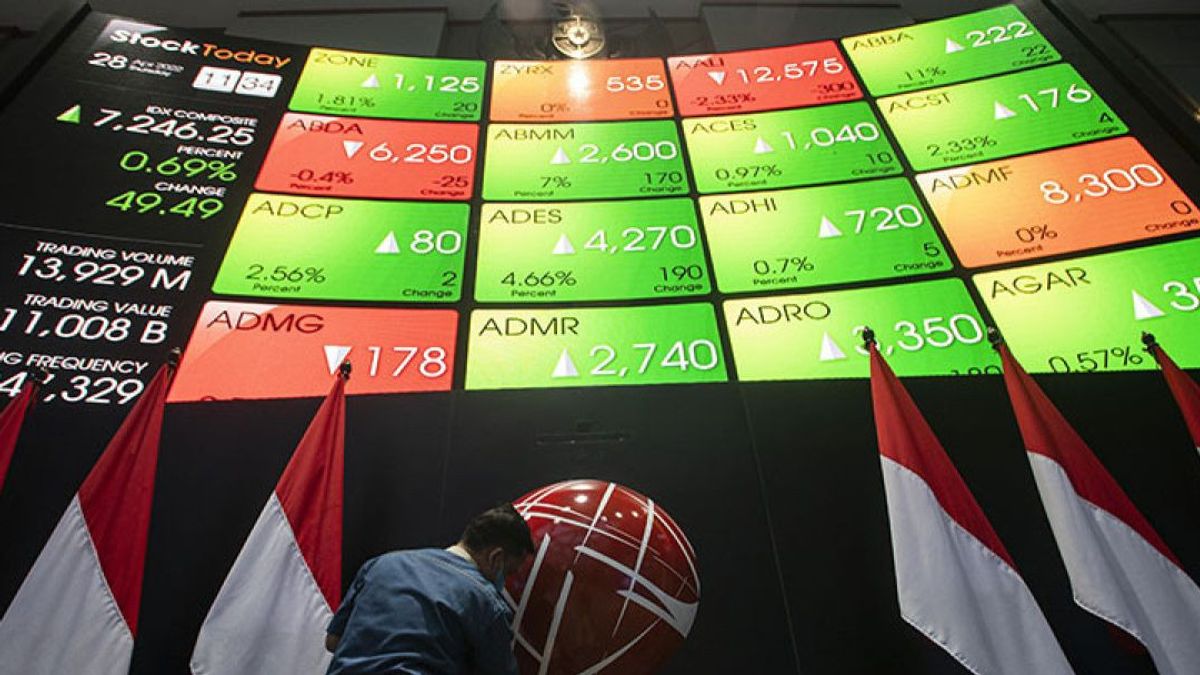JAKARTA - PT Mandiri Sekuritas raised the projected Composite Stock Price Index (JCI) at the end of 2024 to 7,800 with a bull case of 8,000. Previously, the JCI was projected to be at the level of 7,460 with a bull case of 7,640.
Head of Equity Analysis and Strategy Mandiri Sekuritas, Adrian Joezer said the projection had taken into account the Fed and BI interest rates falling more aggressively.
According to Adrian, the strong return will further make the JCI an attractive asset class at this time with an 8 percent revenue and a 5 percent dividend yield.
"With the improvement in market coverage and positive profit revisions in both large and medium-capacity stocks, the JCI is still attractive considering the strengthening of the Rupiah exchange rate this quarter," he said in his official statement, Tuesday, September 3.
In addition, Adrian said that strengthening the JCI can also continue to strengthen among proxies that are sensitive to the rate of sensitivity proxies and remain mild in the consumer cyclicals (retail, automotive, and technology) sector, as well as towerscos.
"We project that the JCI can reach 7,800-8,000 by the end of 2024," he explained.
Adrian said Mandiri Sekuritas raised the JCI target from 7,460 because it had raised the assumption of lowering the Fed interest rate from 25 bps to 50-75 bps, with a more aggressive reduction in BI interest rate of 50 bps, not 25 bps.
"The market is now ignoring a 100 bps Fed rate reduction this year, which can still change," he said.
Meanwhile, for the JCI valuation, Adrian said that especially big caps, stocks were still relatively cheap. Although the yields from INDOGB10Y have decreased from 7.2 percent to 6.6 percent.
"The further decline to a low level of -6 percent and <6 percent will make the JCI an attractive asset class in the country, given the yield of 8 percent income and 5 percent dividend yield," he said.
On the other hand, Adrian said that the market spreadth also improved unlike in 2023 when 4 large banks were driving the index, revising income, and foreign flows. Companies with large and medium-sized capitalization of SMID experienced an increase in the revised ratio of EPS in the last two months.
Meanwhile, the rupiah's appreciation of 5 percent this quarter and the stable decline in year-on-year coal prices will reverse year-on-year growth in ex-bank corporate EBITs to positive.
Adrian said that strengthening the rupiah will also increase the space for baqi for easing domestic policies, such as lowering interest rates which are estimated at 50 bps in 2024 and expanding liquidity compared to Semester 1 2024.
"This will have a positive impact on the cost of bank funds, as well as for companies that have high leverage," he said.
SEE ALSO:
Meanwhile, the 2025 Revenue and Expenditure Budget Draft (APBN), with a stronger revenue growth of 6.9 percent and slower spending growth of 5.9 percent, resulted in a fiscal deficit that was lower than estimated at 2.5 percent, profitable for bonds and rupiah.
"Although the production of consumption of several stocks remains the main choice because of the social safety net that supports, fiscal caution is a good sign for the strong self-exchange rate of rupiah securities, which supports the production of upper-middle income, which is driven by potential spending recovery discretion," he explained.
Adrian added that the plan to increase VAT and tax reform could pose a short-term growth barrier, but it is expected to improve the tax ratio and economic strength in the medium and long term.
"Domestic mutual funds, based on data in July 2024, have a strong position in the consumer non-cyclicals, infrastructure, Big-4 Banks, and property, telekom, towercos, and consumer cyclicals sectors that benefit from lower interest rates and strengthening rupiah," he said.
The English, Chinese, Japanese, Arabic, and French versions are automatically generated by the AI. So there may still be inaccuracies in translating, please always see Indonesian as our main language. (system supported by DigitalSiber.id)
















